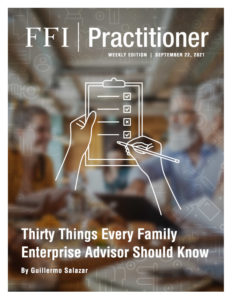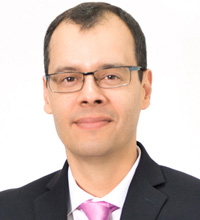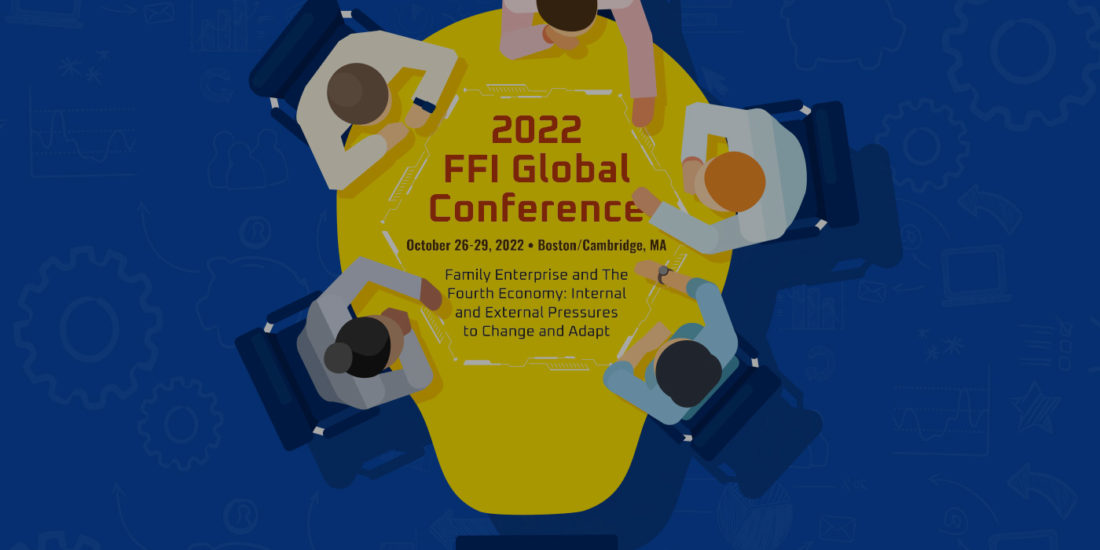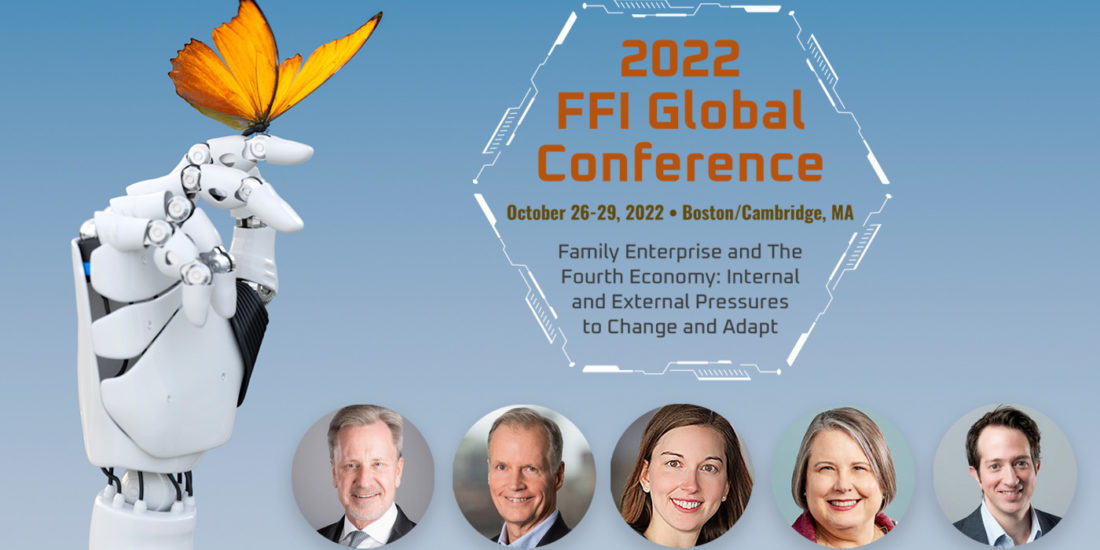
View this edition in our enhanced digital edition format with supporting visual insight and information.
Thank you to this week’s contributor, Guillermo Salazar, for continuing our series of editions by presenters at the in-person 2021 FFI Global Conference. In this edition, Guillermo shares a list of 30 things family enterprise advisors should know that is informed by his experience in the field. We hope you find the list interesting and thought provoking, and you have your choice of reading it in English or Spanish!
More than two decades serving as a business family advisor teaches you a lot. I am not referring so much to theory as practice: experts learn their discipline in the field. Many of the lessons that helped me to better serve my clients did not come from schools or books. The families themselves have shown me the keys to working with them and building professional and satisfactory results together.
Based on my experience, I have compiled a series of ideas to help advisors in the family business field expand and improve their methods. I present this selection based on my personal criteria, supported by the development of empathy and intuition that allows advisors to see beyond the senses when working with families in business. It does not pretend to be a complete or definitive list.
Family
Yes, it’s true: blood ties will always be mighty. As an individual external to each family system, practice will always demand that advisors avoid triangulations between members of the family, and between the family and the advisor. That’s why I suggest that advisors should know:
- Who the client really is.
- When to accept an invitation to dinner or have a few drinks with your client.
- When to tell a joke to distress and connect.
- When to ask a family member to listen and let others be heard.
- When siblings are only working together to preserve a joint venture or to make their parents happy.
- How to help maintain a relative balance in contributions of all family members during discussions and how to encourage reluctant members to participate.
- That asking what is “fair” and what is not will prompt different answers among family members.
- That education and experience are not the only factors in developing one’s personality.
- That in a conflict, the three alternatives of the business family are: a commitment to coexist, to break up, or to do nothing, and that ninety percent of families opt for the third option.
- That next generations know much more about their parents than the parents may realize.
Succession
Every family enterprise advisory process involves, directly or indirectly, the issue of succession. Knowing how to perceive what is hidden within each opinion helps advisors to understand everyone’s expectations, fears, and aspirations regarding the future they want. For a succession plan to be feasible, it must satisfy both individuals and the family. To shepherd succession plans, it is my opinion that every advisor should know:
- That a succession process can last many, many years.
- The difference between power and authority.
- That the best way to transmit values to the next generation is by example.
- That separation is not the end of the world: members of family businesses are not permanently ordained to be together.
- That leaving a legacy is not an option – the option is what kind of legacy to leave.
Wealth
Sometimes it’s not easy to decipher each family member’s relationship with money since our idea of wealth shapes our perception. Fortunately, we can deliver a certain degree of objectivity and translate much of this information into numbers, which is the language that business partners must learn to speak. Advisors can help families build trust with each other by fostering a culture of transparency and accountability. Still, enterprising families will always depend on the ability of the owners to interpret basic data generated by financial reports. That is why, to support a business family in this regard, advisors should know:
- How the planet’s wealth is distributed among the world’s population and how it is distributed among the inhabitants of the country where your client lives.
- The difference between charity, corporate social responsibility, and philanthropy.
- That taxes can radically change your client’s strategy.
- That time is the most precious asset we have.
- That not everyone in the same family has the same risk appetite.
Professional development
Understanding the dynamics of a family means that an advisor must be aware that she or he can become the client’s next scapegoat. That’s why, in my opinion, objective advisors must learn to live without the fear of being fired by a family client at any moment. However, this is something advisors can only achieve if they have achieved solvency in the relevant aspects of their professional lives. So, I think advisors should know:
- When to politely reject a service request.
- How to give a two-hour conference without a slide deck nor a computer.
- What it means to start your own business. This humbling experience can bring an advisor closer to their client.
- How to tell stories—a charming skill to have.
- How to speak respectfully of your colleagues and how share your knowledge with them.
- That an advisor’s skillsets do not have to serve all types of families. On the contrary, there may be several types of family enterprises that best fit an advisor’s competencies and serving these clients will maximize the value an advisor can bring to his or her clients.
- That speaking effectively is a necessity while listening is an art.
- That families are solely responsible for their decisions, not the advisor.
- How to watch the movie “Parasite” by Bong Joon-ho, without judging either of the two families.
- The lyrics to the song “Father & Son” by Yusuf / Cat Stevens… by heart.
What are your reactions to this list? My original collection had over 100 ideas, so I’m sure there are some thoughts that I have missed. I’m interested in the opinion of my colleagues and invite you to email me any comments on this article or any additional element that you have observed that I may have omitted, based on your experience, that can supplement this writing.
About the Contributor
 Guillermo Salazar is the founder and managing director of Exaudi Family Business Consulting. Guillermo is a lecturer, educator, author, and expert advisor on family governance, strategic succession planning, generational transition and conflict resolution. He is an FFI Fellow, former FFI board member, and a former member of the GEN (Global Education Network) faculty. Guillermo is the recipient of the 2015 FFI International Achievement Award and was the chair of the 2019 Global Conference Program Committee. He can be reached at guillermo.salazar@exaudionline.com.
Guillermo Salazar is the founder and managing director of Exaudi Family Business Consulting. Guillermo is a lecturer, educator, author, and expert advisor on family governance, strategic succession planning, generational transition and conflict resolution. He is an FFI Fellow, former FFI board member, and a former member of the GEN (Global Education Network) faculty. Guillermo is the recipient of the 2015 FFI International Achievement Award and was the chair of the 2019 Global Conference Program Committee. He can be reached at guillermo.salazar@exaudionline.com.

View this edition in our enhanced digital edition format with supporting visual insight and information.





